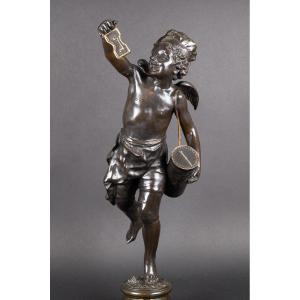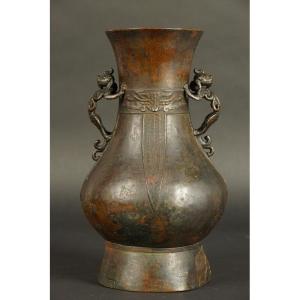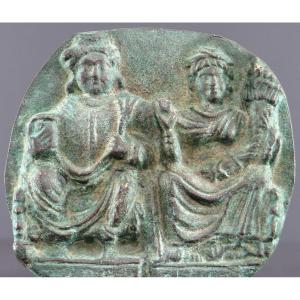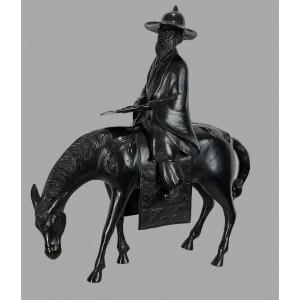Japan, Edo period, 17th century.
Height 34.5 cm, width 17.5 cm, depth 12 cm.
Good condition, rubbing of the natural patina, brush missing in the left hand.
K'uei Hsing (Kui Xing) is a figure in Chinese mythology, the god of examinations and literature, and the patron saint of scholars. He stands on the head of a fish-dragon and holds a brush in his right hand. It is said to be a historical figure, a poor but brilliant student named Zhong Kui, who passed the imperial examinations with great honors. However, due to his ugliness, he was not allowed to enter government service. In despair, he drowned, but was carried by the legendary dragon fish to the sky, where he became a star ("Xing" in Chinese) of the constellation Ursa Major (known in China as the Palace of Literary Genius), that is, he rose among the patron stars of literature. Since the Chinese sign Kui is composed of an ideogram meaning "demon" and an ideogram meaning "cross-eyed," Kui Xing is often depicted with a demonic appearance, a hideous face, a horn-like protuberance on his head, and a disproportionately large body. Its representations in China are known from the Song Dynasty (960-1279).
Similar sculptures:
https://collections.artsmia.org/art/5798/kui-xing-china
https://collections.vam.ac.uk/item/O166038/kuixing-figure-of-kuixing-unknown/
https://www.christies.com/en/lot/lot-6073349
https://www.christies.com/en/lot/lot-6318644
Free shipping in the European Union! I send parcels by insured mail (DPD or DHL). All items are packed very carefully. Payment by international bank transfer. I will issue a certificate of authenticity upon request.






























 Le Magazine de PROANTIC
Le Magazine de PROANTIC TRÉSORS Magazine
TRÉSORS Magazine Rivista Artiquariato
Rivista Artiquariato
